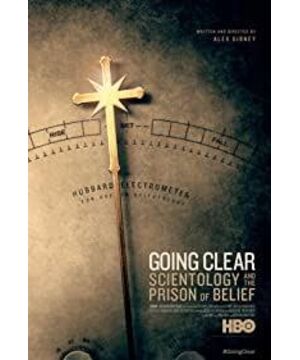Scientology was founded in the United States by L. Ron Hubbard in 1954. Its concepts of happiness, communication, and methods such as purifying programs to eliminate memory marks have attracted many congregations, including many Hollywood stars. Driven by the celebrity effect, the teaching developed more rapidly. But on the other hand, scandals continue, and it is rumored that a lot of money has been collected, religious believers have been abused, and friction with the government has continued. This film attempts to present a more real Scientology through the narration of 8 former Scientologists.
The theme of the film has never been separated from the word "faith", whether it is through detailed and complete interviews with eight former Scientologists, or presenting the understanding of faith by the two church leaders, and the original author’s analysis of Scientology, All make the film's interpretation of the theme of "the cage of faith" more profound. Different from simply pointing the reasons for believing in a cult to the stereotype of "the deceiver is greedy for money and the deceived is ignorant", the eight protagonists in the film all embody their own rational judgment and love for life. They join Scientology Much of it is out of the pursuit of beautiful ideas that promote self-realization, such as happiness, goodwill, and saving the world.
Therefore, regarding the understanding of "faith", I would like to analyze it from the other two perspectives-the purpose and means of self-realization, and how to face the "false" in belief and the "truth" in reality.
In the film, the believers of Scientology use some seemingly effective means to achieve self-realization, but in fact their selves are controlled by the church. These methods are packaged by the church with deliberate rationalization, which leads to only a false self-realization path. In reality, people often cannot tell what is wrong with this deliberately packaged, seemingly direct result.
I only see the purpose, but not the means, and sometimes the purpose and means are often not in the same straight line.
In life, that is, not in terms of religious scams, this kind of thinking tricks are often dormant on the road of modern people's quick success and self-realization, such as pyramid schemes, various short-term quick-acting trainings, success learning courses, etc. Putting all kinds of beautiful but rare concepts such as success, communication, and self-realization into a small body to confuse people's eyes. In fact, this is only a means to seek benefits, and the purpose of the other end of the straight line has long been secretly changed. Another example is a person's inspirational book, which directly uses "integrity to achieve the greatest commercial value" as an excuse to encourage others to do good. Although the meaning is "faith", on another level, it is emphasized that this is only a means. You can use it to package yourself, disguise yourself, and use it for other purposes.
In the same way, Scientology has packaged these beautiful concepts and seemingly effective methods into easy-to-eat candies, but just as bait. As Paul Haggis in this film said, it teaches you how to think independently, but But it is controlling how you think.
In addition, when it comes to the “fake” in faith and the “true” in reality, one has to mention the sexual assault of children by the godfather in this year’s Oscar’s best film "Focus". The crisis of faith in the field. Before the incident was revealed, most of the victims’ family members chose to remain silent, choosing to compromise on their gods. Faced with the godfather who is almost the spokesperson of the faith, they choose to believe in the faith itself rather than in themselves; in the face of the pursuit of real life, they choose to believe in the permanent doctrine that can give a fixed explanation, rather than the real reality of change. "Focus" reflects people’s attitude towards Godfather’s sexual abuse of children, just like Paul Haggis’s attitude in this film when his church members were forced to not use drugs and died on a hunger strike (not mentioned in the film) And this matter, but from the original author LawrenceWright's article "The Apostate" published in the "New Yorker")-Believe in your own beliefs and ignore reality. Even Paul himself was surprised when he recalled. I was so curious that I would turn a blind eye to it. In addition, Paul also explained that many believers comforted themselves that it was their own problem when they kept doing the analysis without actual results. It was because they misled the analysts and allowed this situation to continue.
Simply believing in an enduring and fixed thing, confusing purpose and means, confusing true and false, may be due to the requirement for security and consistency, but this "belief" in life alone is undoubtedly not enough Being wise also undoubtedly requires us to be vigilant.
Of course, no one is an absolute wise man in life, and few people are qualified to take responsibility for the unwiseness of others. Therefore, this film, including this article, does not criticize those who have been trapped in a cage of faith or are still in it.
Through the full narrative, the film shows us the face of Scientology and interprets the theme well, but the documentary is undoubtedly a subjective re-creation of the material. In addition to interpretation, it is more to "believe" our own eyes and the reality in front of us.
View more about Going Clear: Scientology & the Prison of Belief reviews











